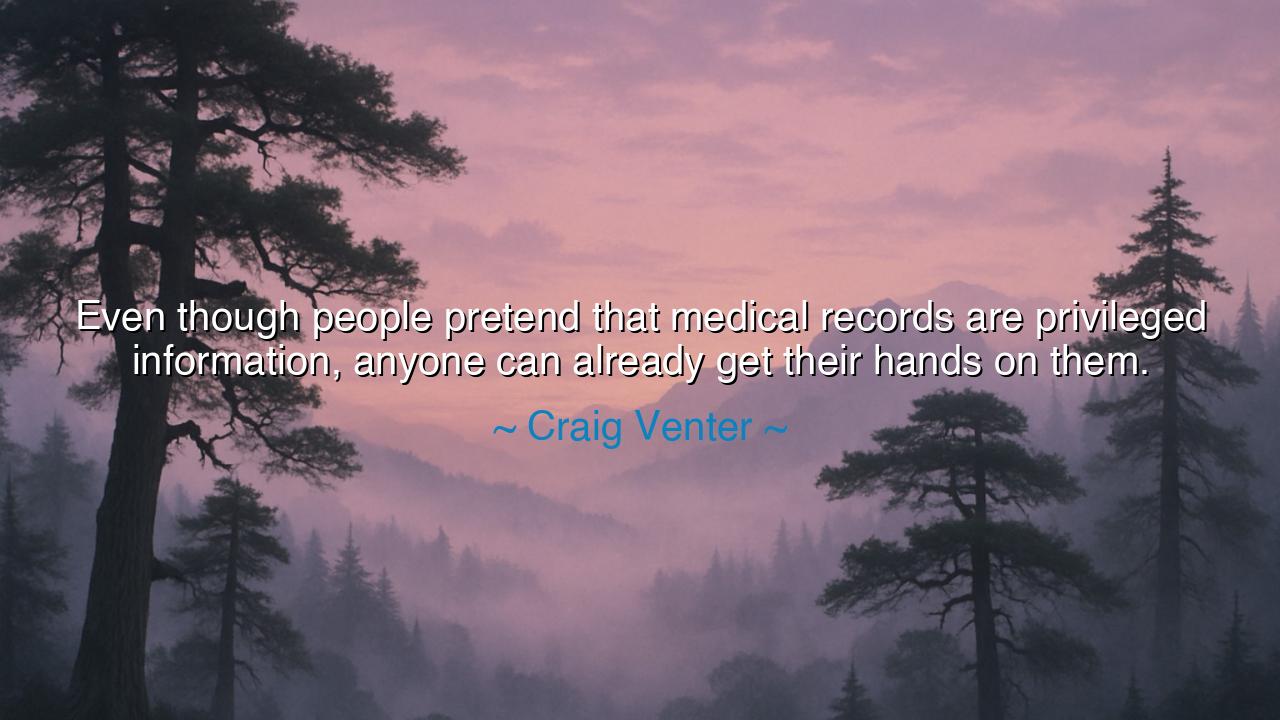
Even though people pretend that medical records are privileged
Even though people pretend that medical records are privileged information, anyone can already get their hands on them.






“Even though people pretend that medical records are privileged information, anyone can already get their hands on them.” Thus spoke Craig Venter, a man who helped map the human genome — one who has looked deeper into the code of life than most mortals ever will. His words are not the cry of cynicism, but the warning of a prophet — a man who sees how knowledge, once sacred, has become perilously accessible. What he reveals is the tragic irony of our age: that while we speak of privacy as a right, we have built a world where secrecy is an illusion, and where the most intimate truths — the records of our bodies and our health — lie vulnerable before unseen eyes.
Venter’s observation arises from his lifelong dance between science and power, between the pursuit of discovery and the ethical weight that follows it. As one of the first to sequence the human genome, he opened a door to unimaginable medical progress — cures, personalized treatments, and the unraveling of the mysteries that shape us. But with that progress came a shadow: the commodification of data, the transformation of human information into currency. Medical records, genetic profiles, and histories once sealed by trust are now scattered across digital systems, copied, traded, and analyzed by those who claim to serve humanity — and yet profit from its vulnerabilities. His words reveal that in the modern world, knowledge and privacy have become adversaries, forever in tension.
The ancients, too, understood the danger of knowledge without restraint. In the myths of Greece, Prometheus stole fire from the gods — the symbol of divine power — and gave it to man. But with that gift came peril, for fire could warm and enlighten, or burn and destroy. So it is with information in our age: it can heal the sick, or expose the innocent; it can build systems of care, or chains of control. Craig Venter’s warning is our modern Promethean parable — that in our quest to illuminate life’s secrets, we may have forgotten to protect the sanctity of the soul behind the data.
His words also carry the sorrow of lost trust. Once, the relationship between doctor and patient was sacred — built upon confidence, compassion, and discretion. The physician was the guardian of the body’s secrets, the keeper of knowledge that was never to be shared beyond the chamber of care. But now, as records flow through networks and systems, that intimacy is broken. A single click, a single breach, can expose what once was hidden behind walls of respect. And thus Venter’s lament: that though we pretend our medical records are “privileged information,” they are in truth prizes in the marketplace of data, open to governments, corporations, and thieves alike.
Consider, for example, the story of Anthem Inc., one of the largest health insurers in the United States, whose databases were breached in 2015. Nearly 80 million individuals had their medical information — names, birthdates, addresses, and even medical IDs — stolen. The guardians of privacy had failed, and the illusion of protection was shattered. What was once sacred had become a digital commodity, stripped of dignity and traded by unseen hands. In this story, Venter’s words find their grim reflection: that we live in an age where information, once considered private, can no longer be contained.
And yet, his message is not despair — it is a call to wisdom. Knowledge, once released, cannot be reclaimed; therefore, it must be governed with conscience. The answer is not to turn away from progress, but to match innovation with integrity, science with ethics, curiosity with compassion. Humanity must learn again what the ancients knew instinctively — that the possession of knowledge is a sacred trust. Just as healers once swore the Hippocratic Oath, so too must the stewards of data swear an oath of privacy — to protect the invisible selves of those who cannot defend themselves in the digital realm.
So, my children, learn this lesson well: guard your information as you would your life, for in this age, they are one and the same. Be mindful of what you surrender to the world, for every record written may one day speak without your consent. Demand transparency from those who hold your trust — the doctors, the corporations, the state. Let your vigilance be your shield, and your wisdom your guide.
For in the end, Craig Venter’s warning is not only about medicine; it is about the fate of humanity in an era where knowledge moves faster than conscience. We must reclaim the sacredness of privacy, not as secrecy born of fear, but as dignity born of self-respect. When knowledge is paired with honor, it enlightens; when it is left unguarded, it enslaves. Let us then build a future where the human soul — even in the form of data — remains inviolate, protected not by pretense, but by principle.






AAdministratorAdministrator
Welcome, honored guests. Please leave a comment, we will respond soon